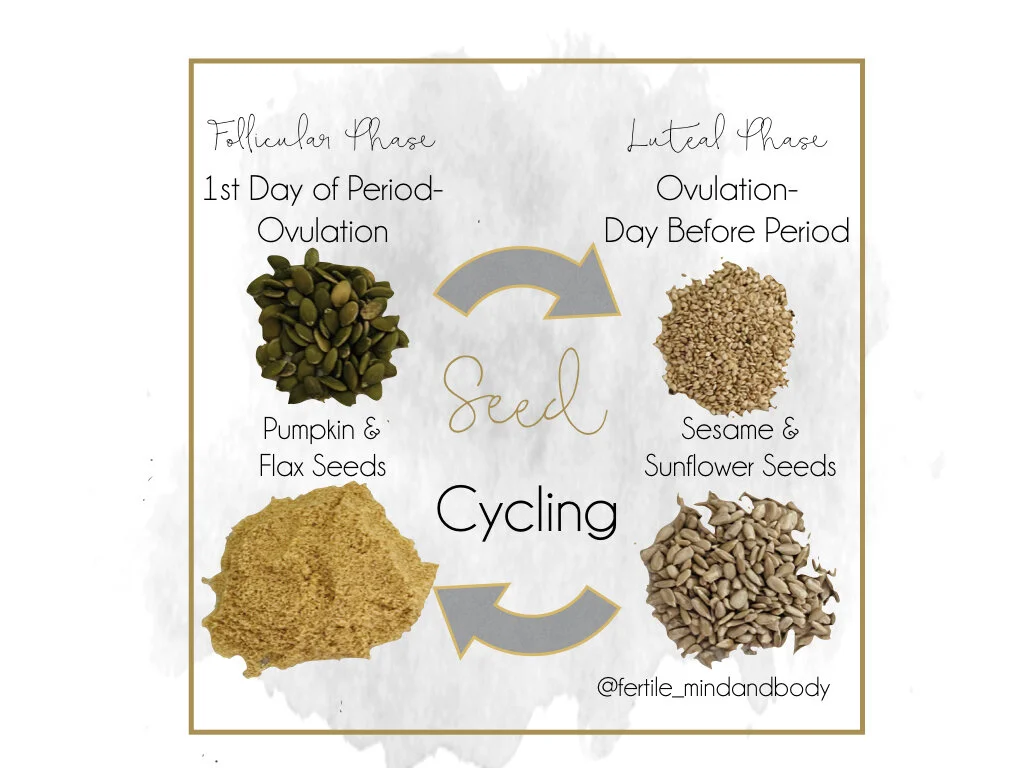Seed cycling is a natural and easy way to fuel your body and balance your hormones through consuming seeds at different times of your cycle.
The idea behind this method is that by eating specific seeds during specific phases of your menstrual cycle, you will naturally support and balance your hormones.
Specifically, pumpkin seeds and flax seeds are recommended in the follicular phase as they contain nutrients that may reduce PMS symptoms while also supporting the necessary nutrients necessary for ovulation. Then, during the luteal phase when progesterone is stronger, seeds like sesame and sunflower are recommended.
Does it work? Maybe.
Could it work? Maybe.
Should you try it? It can’t hurt!
Let’s get into the why of it now…
Seeds for Follicular Phase of Menstrual Cycle
At the onset of bleeding, considered cycle day one, through ovulation, is defined as the follicular stage of the menstrual cycle.
Often times the follicular phase is define incorrectly as cycle day 1 through 14 assuming that ovulation occurs on day 14. However, this phase can range from 10 to 16 days (Reed), so while the average is 14, that does not mean that every person will ovulate exactly on day 14.
This is a time when estradiol, luteinizing hormone (LH), and follicle stimulating hormone (FSH) are climbing to prepare for the follicle and egg for ovulation, while progesterone is staying low so it can do it’s thing to support a possible pregnancy later in the cycle (Reed).
With the rise in several hormones, seed cycle during the follicular phase focuses on seeds that support estrogen and decrease symptoms associated with period pain. The two seeds that are recommended during this time are flax seeds and pumpkin seeds.
Flax seed, which has high amount of fiber that is often missing in Western diets, and lignans, which bind to excess estrogen that aids in effective elimination (Phipps et al.). Furthermore, a small study found that the addition of flax seeds into diets, previous anovulatory cycles (where no ovulation occurs) became ovulatory cycles (Phipps et al.).
Pumpkins seeds have high amounts of zinc and magnesium that help reduce PMS symptoms such as bloating, inflammation, mood changes, and other less than enjoyable symptom associated with our periods (Fathizadeh and Toler). Furthermore, incorporating more magnesium into your diet is always recommended as close to 60% of adults do not consume enough magnesium which is central to so many various systems in our bodies and our overall health (Volpe).
Seeds for Luteal Phase of Menstrual Cycle
The luteal phase is defined as after ovulation to prior to the start of menstruation. This phase, unlike the follicular phase, is often 14 days for all cycling individuals (Reed).
This does not does mean that there are not shorter luteal phases, but often those individuals that have a shorter luteal phase have a luteal phase deficiency are classified by insufficient progesterone.
Estradiol, LH and FSH all hit their peak prior to ovulation, and during the luteal phase, they are dropping quickly and significantly. Progesterone, on the other hand, rises quickly post ovulation, with the intended purpose to support a possible pregnancy. The drop in progesterone when a pregnancy is not present is one aspect that signals the body to start menstruation (Reed).
Seed cycling during the luteal phase is then going to focus on seeds that support this rise of progesterone, but the falling of your other hormones. Specifically, sesame and sunflower seeds are used during this stage.
Sesame seeds are known to be rich in Magnesium, Vitamin B1, Zinc, Selenium and Vitamin B6, all extremely important for fertility health. Furthermore, these tiny giants are full of healthy fatty oils that we all need more of! These fatty oils can lower blood pressure, increase antioxidant status, and reduce inflammation (Elleuch). Furthermore, sesame seeds enhance vitamin E activity, which prevents anti-aging related diseases (Elleuch)!
Sunflower seeds, a perfect compliment to sesame seeds, are also high in zinc and contain vitamin E to help with progesterone production. Furthermore, sunflower seeds are packed with "healthy unsaturated fats, protein, fiber and other important nutrients like vitamin E, selenium, copper, zinc, folate, iron and phytochemicals” (Muhammad Anjum, et al., 545). With the addition of these powerhouse of nutrients, not only are menstrual cycles being regulated, but women’s overall health is improving by incorporating so many necessary missing components.
How to Incorporate Seed Cycling Into Your Life
Unless you love eating just plain seeds, most people who incorporate seed cycling into their routines put the seeds into or onto another food. However you do incorporate the seeds, blending them into powder, especially the flax seeds, is very important for better digestion.
Some of our favorite ways to incorporate these seeds are as follows:
In your daily smoothie: This is a great way for many reasons. First, if you have a powerful blender, there is no need to grind the seeds prior. Secondly, this is a great way to get other powerful fertility boosting foods into your day (hello spinach, blueberries, nut butters, collagen, etc. The possibilities are endless!)
On top of your yogurt: This is great because not only are you getting your seeds, but you are also working on your gut health with some great probiotics from your yogurt. If you do this one, we tend to recommend that you stick with a plain greek yogurt and add honey or a sweetener rather than buying a sweetened yogurt to cut back on some sugar.
Mixed into your oatmeal: Another great way to start your day is with a bowl of oatmeal! You can add all sorts of great additions to the oatmeal in addition to your seeds for a super fertility friendly way to start your day!
We hope this gave you a great idea of seed cycling and if it is right for you to try! Remember, we are not giving medical advice but just helping you learn your options related to improving your fertility and overall health.
Our fertility doula is available to provide more personalized support and guidance during your fertility journey if this is something that you think would be beneficial for you!
Resources
Elleuch, Mohamed, et al. “Sesame (Sesamum Indicum L.) Seeds in Food, Nutrition, and Health.” Nuts and Seeds in Health and Disease Prevention, 2011, pp. 1029–1036., doi:10.1016/b978-0-12-375688-6.10122-7.
Fathizadeh N, Ebrahimi E, Valiani M, Tavakoli N, Yar MH. Evaluating the effect of magnesium and magnesium plus vitamin B6 supplement on the severity of premenstrual syndrome. Iran J Nurs Midwifery Res. 2010;15(Suppl 1):401-405.
Muhammad Anjum, F., Nadeem, M., Issa Khan, M. and Hussain, S. (2012), "Nutritional and therapeutic potential of sunflower seeds: a review", British Food Journal, Vol. 114 No. 4, pp. 544-552. https://doi.org/10.1108/00070701211219559
Phipps, W.R., Martini, M.C., Lampe, J.W., Slavin, J.L., Kurzer, M.S., Effect of flax seed ingestion on the menstrual cycle, The Journal of Clinical Endocrinology & Metabolism, Volume 77, Issue 5, 1 November 1993, Pages 1215–1219, https://doi.org/10.1210/jcem.77.5.8077314
Reed BG, Carr BR. The Normal Menstrual Cycle and the Control of Ovulation. [Updated 2018 Aug 5]. In: Feingold KR, Anawalt B, Boyce A, et al., editors. Endotext [Internet]. South Dartmouth (MA): MDText.com, Inc.; 2000-. Available from: https://www.ncbi.nlm.nih.gov/books/NBK279054/
Toler, S. DNP. “Does Seed Cycling Impact Fertility? Here's What We Found.” Seed Cycling: Does It Work? I Tried It., Clue, 13 Feb. 2020, helloclue.com/articles/culture/seed-cycling-i-tried-it-and-dug-into-the-research-on-whether-it-works.
Volpe SL. Magnesium in disease prevention and overall health. Adv Nutr. 2013;4(3):378S-83S. Published 2013 May 1. doi:10.3945/an.112.003483











